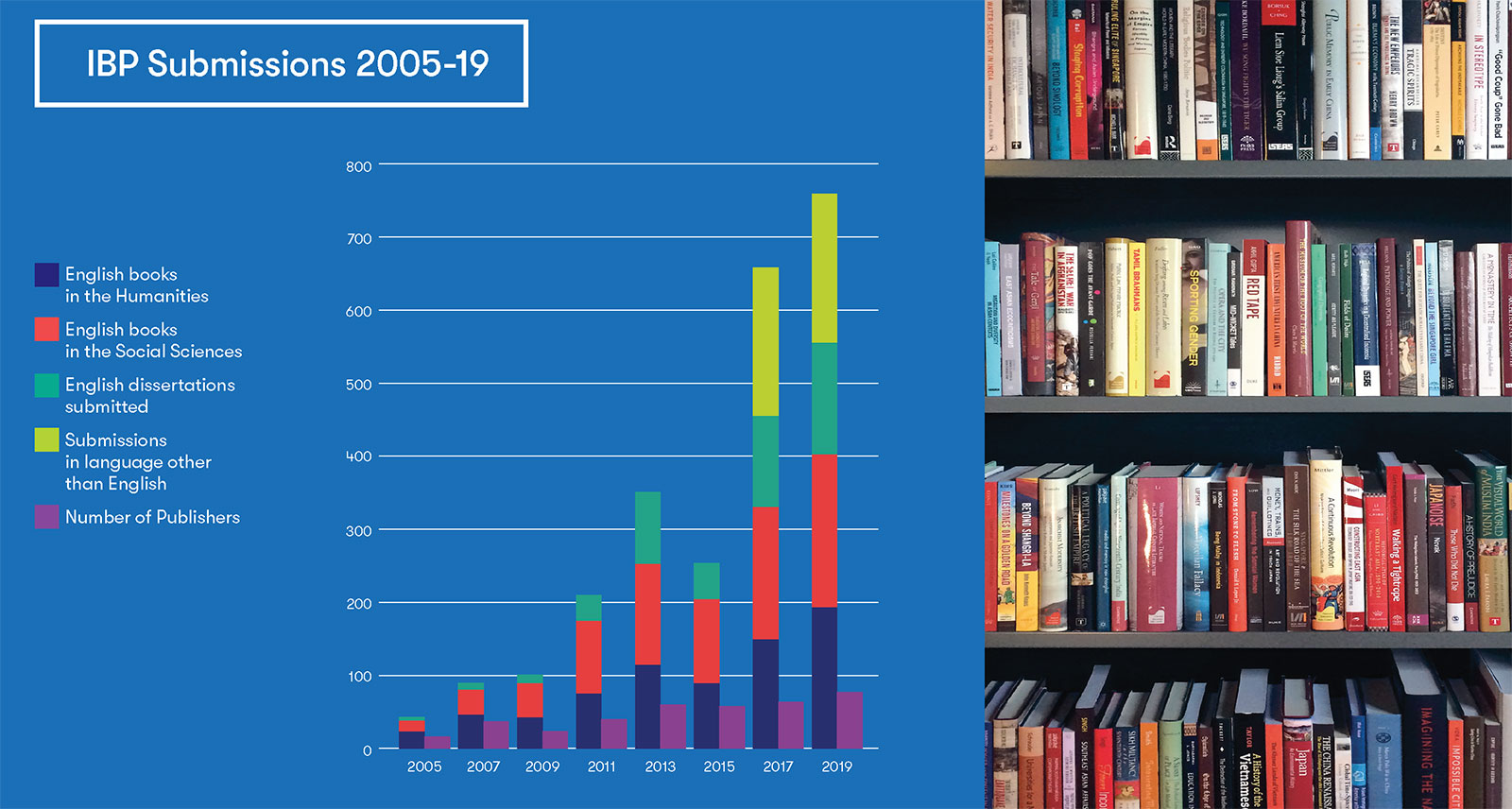The ICAS Book Prize: A multilingual window on the world of Asian studies
The International Convention of Asia Scholars (ICAS), founded in 1997, had its first gathering in Leiden (1998). During ICAS 2 in Berlin (2001) the ICAS Secretariat was officially founded, and since its creation it has been hosted and (partially) funded by the International Institute for Asian Studies (IIAS, Leiden, the Netherlands). After the success of the first two meetings the ICAS Secretariat decided to move its conferences into Asia, and ICAS 3 took place in Singapore (2003), in cooperation with the National University of Singapore. As to further establish its brand and position in the field of Asian studies, ICAS launched two significant initiatives: the ICAS Publication Series in cooperation with Amsterdam University Press (AUP), primarily based on articles presented during ICAS, and of course, the ICAS Book Prize (IBP).
Right from the start, the IBP was designed to be different in nature than the (few) prizes in the field of Asian studies at that time. The existing prizes were limited to particular regions or disciplines, and often named after one of the professorial stars in the field. Access to and judgement of the prizes tended to occur in a rather closed circle of familiarity, and was mostly resistant to outside interference. There was clearly room for improvement and innovation.
Turning the first page of the ICAS Book Prize
The main idea behind the ICAS Book Prize (IBP) was to create, by way of a global competition, an international focus for academic publications on Asia so as to increase their visibility worldwide, also beyond academic circles. As a result, the IBP was conceived as a general prize for academic publications on Asia, in both the humanities and social sciences. The IBP Reading Committees consist of scholars in diverse disciplines, focusing on various regions, working on and originating from different continents: a composition that reflects the transcending nature of ICAS.
The ICAS Secretariat approached a diverse group of participants of the first three ICAS meetings with the question if they would be willing to become a member of the IBP Reading Committee. Excellent remuneration was offered, including a return ticket to ICAS, free lodging for the duration of the meeting, plus of course they could keep all the submitted books. No wonder there were more than enough candidates to choose from. The first Reading Committee consisted of four members, a secretary and a chair. They originated from Asia, Australia, Europe and North America, and represented the broad fields of the humanities and social sciences in relation to Asia.
IBP 2005, Shanghai
All books on Asian topics
With a Reading Committee in place we started promoting the IBP through various platforms, including the IIAS Newsletter. On page 42 of issue 34 (2004), the IBP was announced to the world for the first time: “All scientific books published in 2003 and 2004 on Asian topics are eligible. Three prizes will be awarded: (1) best study in the humanities; (2) best study in the social sciences; and (3) best PhD dissertation.” We reached out to a large number of (academic) publishers, who in general welcomed the new concept. In all we received 38 books (23 humanities and 15 social sciences) and five dissertations. The shortlists of three books per category were made public during a brief ceremony in the ICAS exhibition booth at the Annual Meeting of the Association for Asian Studies (AAS) in Chicago on 1 April 2005.
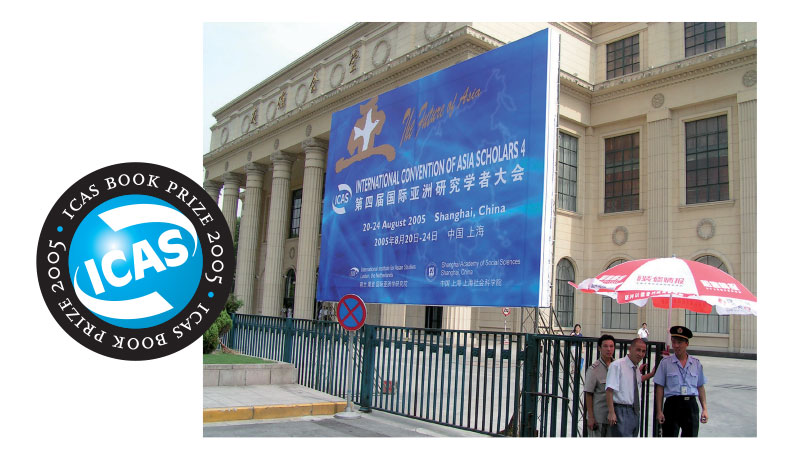
The Reading Committee met in Shanghai, one day before the opening of ICAS 4, for final deliberations during the so-called ‘decision dinner’. The first IBP Awards Presentation took place on 20 August 2005, in the Friendship Hall of the Shanghai Exhibition Center. At the end of the ICAS Opening Ceremony the IBP Secretary presented the jury report, which was based on citations provided by members of the Reading Committee. The IBP Awards Presentation would become a permanent feature of all future ICAS Opening Ceremonies. Shortly after the ceremony, the jury citations were put on the ICAS website (where they can still be found) and shared with multiple Asia studies outlet, such as H-Asia.
The winners of the first IBP were both present at the Awards Ceremony. They were Elizabeth C. Economy for her The River Runs Black: The Environmental Challenge to China's Future (Cornell University Press, 2004) and Christopher Reed with his Gutenberg in Shanghai: Chinese Print Capitalism, 1876-1937 (UBC Press, 2003). Sam Wong was the first winner of the IBP Best Dissertation Award with his thesis ‘Community participation of Mainland Chinese migrants in Hong Kong – rethinking agency, institutions and authority in social capital theory’. As a prize, his dissertation was published by AUP in the ICAS Publications Series: Exploring 'Unseen' Social Capital in Community Participation. Everyday Lives of Poor Mainland Chinese Migrants in Hong Kong (available from http://oapen.org). It was no small wonder that three publications on China won prizes, since a substantial part of the submitted books were about this upcoming political and economic powerhouse. In a special section of the IIAS Newsletter #37 - ‘Publishing on Asia’ - this was further contextualised and a rich tapestry of publications on all parts of Asia were highlighted. (https://issuu.com/iias/docs/iias_nl_37)
IBP 2007, Kuala Lumpur
IBP Colleagues’ Choice Award
Based on comments from ICAS 4 participants, the ICAS Secretariat was motivated to initiate the Colleagues’ Choice Award, in order to enable persons interested in Asia to cast a vote for their favourite book. This was only possible thanks to recent IT developments. An online polling system was established, and voting was possible from mid-March to mid-July. Giving a voice to the practitioners was in line with the ICAS bottom-up approach to the field of Asian studies. From the beginning we were aware of the fact that the winning title of the Colleagues’ Choice Award would not necessarily be the ‘best’ publication, but rather the book with an author or publisher best equipped to mobilise votes for their publication. In order to be a successful author this is not an unimportant aspect of publishing.
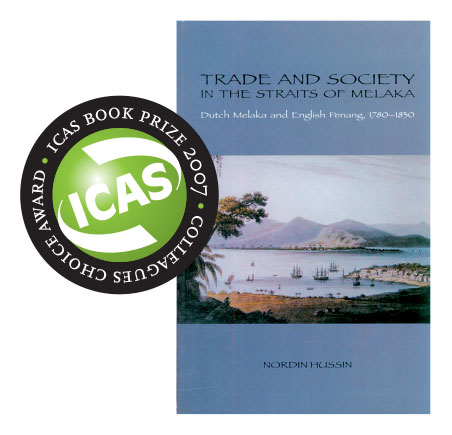
Nordin Hussin – the first winner of the IBP Colleagues’ Choice Award.
The first winner of the IBP Colleagues’ Choice Award was Nordin Hussin, working at the Institute of Occidental Studies of the Universiti Kebangsaan Malaysia, the organising entity of ICAS 5. Here follows a part of the citation, which sheds light on why voters liked his book: “Without a doubt Trade and Society in the Straits of Melaka: Dutch Melaka and English Penang, 1780-1830 (NIAS Press, 2006) is a truly pioneering study of urban history, one that we rarely see in Southeast Asia. This study compares Melaka and Penang in the context of overall trends, namely, policy, geographical position, nature and direction of trade, morphology and society, and how these factors were influenced by trade as well as policies […] By documenting the impact of imperialist ambitions on the economy and society of two major trading centres, this book will provide a point of reference for all future research concerning the period.”
The Reading Committee reviewed 80 books and 10 dissertations. The members of the Reading Committee were: Jennifer Holdaway, Christopher Reed (winner of the IBP 2005 Humanities), Paul van der Velde (Secretary), Anand Yang (Chair), and Guobin Yang. The prizes were awarded by Deputy Prime Minister Dato’seri Najib Tun Razak during the ICAS 5 Opening Ceremony at the Crowne Plaza Hotel in Kuala Lumpur on 2 August 2007.
The winner of Best Book in the Humanities was Madeleine Zelin, with her The Merchants of Zigong (Columbia University Press, 2006); the winner of Best Book in the Social Sciences was Pei-Chia Lan and her Global Cinderellas. Migrant Domestics and Newly Rich Employers in Taiwan (Duke University Press, 2006). Winner of Best Dissertation in Asian studies was Karen Laura Thornber, for her thesis ‘Negotiating and Reconfiguring Japan and Japanese Literature in Polyintertextual East Asian Contact Zones: Japan, China, Korea, Taiwan’ (Harvard University).
For the first two editions of the IBP, the Reading Committee reached their final decisions during a dinner one day before the Awards Presentation. After IBP 2007, it was decided to expedite the decision-making process so that the shortlisted authors could be informed earlier in the year, so as to increase the likelihood that they could and would attend ICAS.
IBP 2009, Daejeon
The network search for dissertations
The third IBP Awards Presentation took place during ICAS 6, on 6 August 2009, in the Grand Ballroom of the newly built Daejeon Convention Center. The Awards were presented by the members of the Reading Committee: Mehdi Amineh, Vinesh Hookomsingh, Xiaoming Huang, Alex MacKay, Paul van der Velde, and Anand Yang. After the ceremony, all ICAS 6 participants could pick up two free copies of the ICAS Publications Series, of which eight were launched during a special session with more than fifty editors and contributors present.
The 2009 winner of Best Book in the Humanities was Anthony Barbieri-Low, Artisans in Early Imperial China (University of Washington Press, 2007); the winner of Best Book in the Social Sciences was Anne E. Booth, Colonial Legacies: Economic and Social Development in East and Southeast Asia (University of Hawai'i Press, 2007); Laurent Pordie was the winner of the Colleagues’ Choice Award, for the edited volume Tibetan Medicine in the Contemporary World: Global politics of medical knowledge and practice (Routledge, 2008); Best Dissertation in the Humanities was won by Birgit Abels for her thesis ‘Sounds of Articulating Identity: Tradition and Transition in the Music of Pulau’; and the winner of Best Dissertation in the Social Sciences was Iza Hussin with ‘The Politics of Islamic Law: Local Elites and Colonial Authority in Malaya, India and Eygpt’.
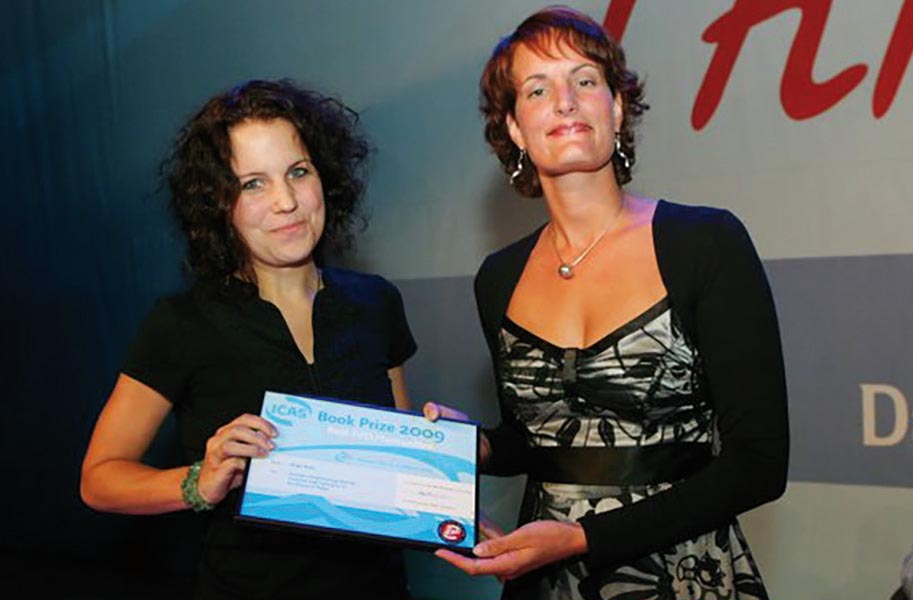
Winner Birgit Abels (left) and Martina van den Haak
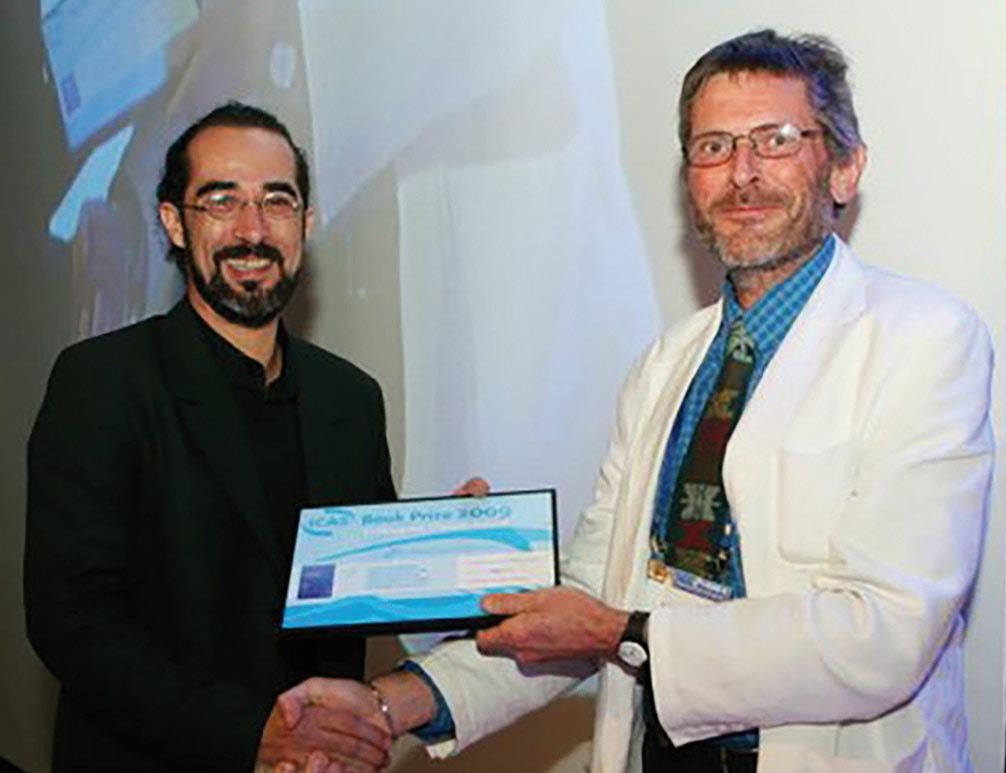
Winner Laurent Pordié (left) and Alex McKay
While the number of books submitted for this edition of the IBP had neared one hundred, the dissertations were lagging with just 12 submissions, which were obviously only a fraction of all dissertations written on Asia in English. What could be done to increase that number for the next IBP? We thought the best way to tackle this situation was to put in place a special Reading Committee for Dissertations, consisting of peers of the young doctors. Whom better to ask than the IBP 2009 Best Dissertation winners: Birgit Abels (humanities) and Iza Hussin (social sciences). We invited them to scout for dissertations all over the world and use their growing academic networks to at least double the number of dissertation submissions for the following IBP in 2011.
IBP 2011, Honolulu
From traditional to contemporary Asian studies
The fourth IBP Awards Presentation took place on 1 April 2011 in the Kalakaua Ballroom of the Hawai’i Convention Center, during the Opening of ICAS 7; it was combined with the Ceremony of the seven Association for Asian Studies (AAS) regional book prizes. President of Ceremonies was four-time IBP Books Reading Committee Chair, Anand Yang, not only one of the pillars of the IBP but also one of the promoters of the joint meeting of ICAS 7 and AAS in Honolulu, which took place from 30 March to 3 April 2011. No less than five thousand participants attended the meeting, making it the biggest ever held in the field of Asian studies. It was a clear signal to the outside world that Asian studies was alive and kicking.
The public relations campaign around the combined meeting also had a positive impact on the number of books and dissertations submitted to the IBP. Book numbers doubled while the number of dissertations even tripled. The latter also implied that the newly created IBP Dissertations Reading Committee had done an excellent job. In all, 174 books were submitted by more than 40 publishers worldwide; 75 in the humanities and 99 in the social sciences. A trend that had already been noticeable in IBP 2009 became fully manifest during the fourth edition: whereas for the first IBP, 65 percent of the books had been in the humanities and 35 percent in the social sciences, it was completely the other way around for the fourth edition. This marked a clear shift in the field of research from traditional (orientalist) to contemporary Asian studies. This also became clear in the supplement of The Newsletter #56 ‘Asian Book Series as Global Currency’. Many of those featured series were contemporary in nature (https://issuu.com/iias/docs/icas_nl56_supplement).
This was not the only shift we observed. We also saw a clear change in geographical backgrounds of the authors. During the first IBP only 10 percent of the participating authors were of Asian descent; the fourth edition of the IBP saw a marked increase to 40 percent. Asian studies were clearly more and more being carried out by Asian scholars, yet their books (in English) continued to be predominantly published by Western publishers. Unsurprisingly, a third of the books submitted for the IBP 2011 were about East Asia, but Southeast Asia and South Asia also counted a large number of publications. Popular themes were art and culture, (post)colonial, gender and identity, history, international relations and politics, literature, media, Islam (a newcomer), literature, nationalism and state formation, society religion and society. With such a wide diversity of excellent books we started thinking of ways to reward more books than only the main winners. This was successfully developed for the next IBP in 2013.
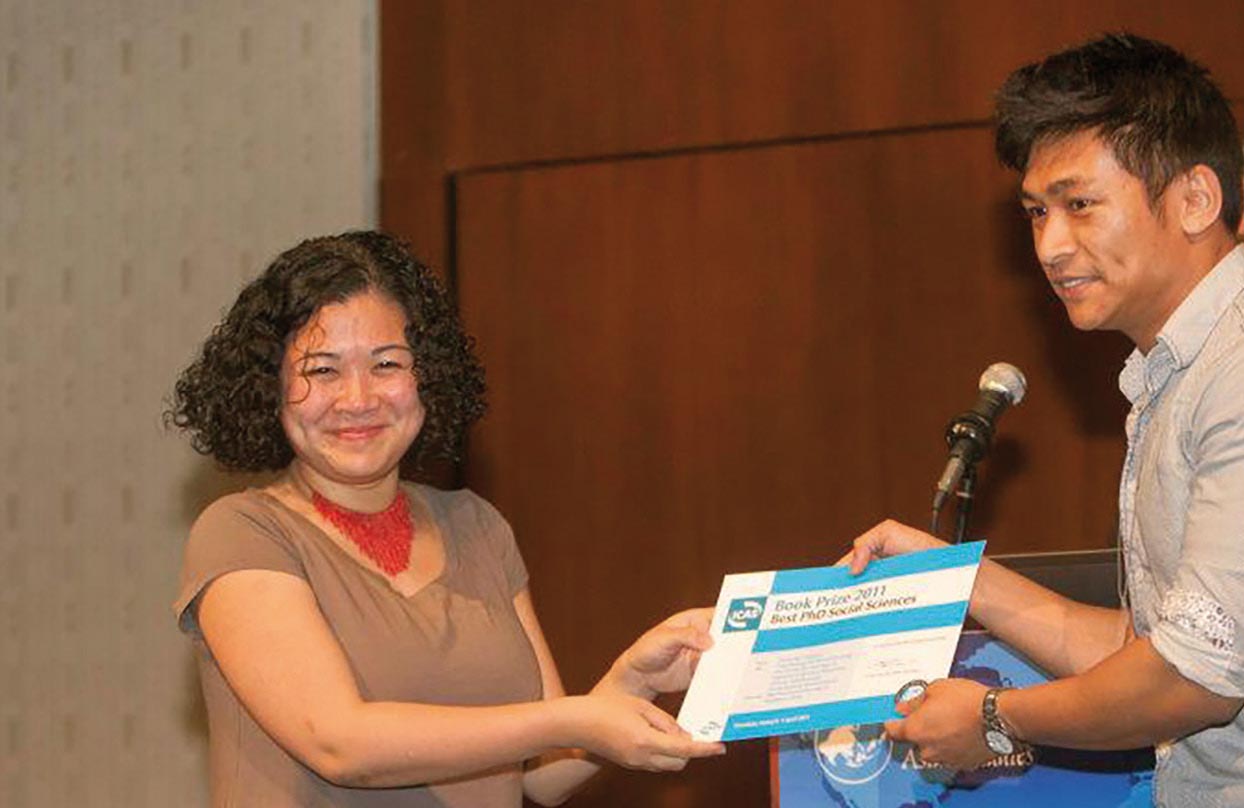
Iza Hussin (left) and Winner Imran bin Tajudeen (right)
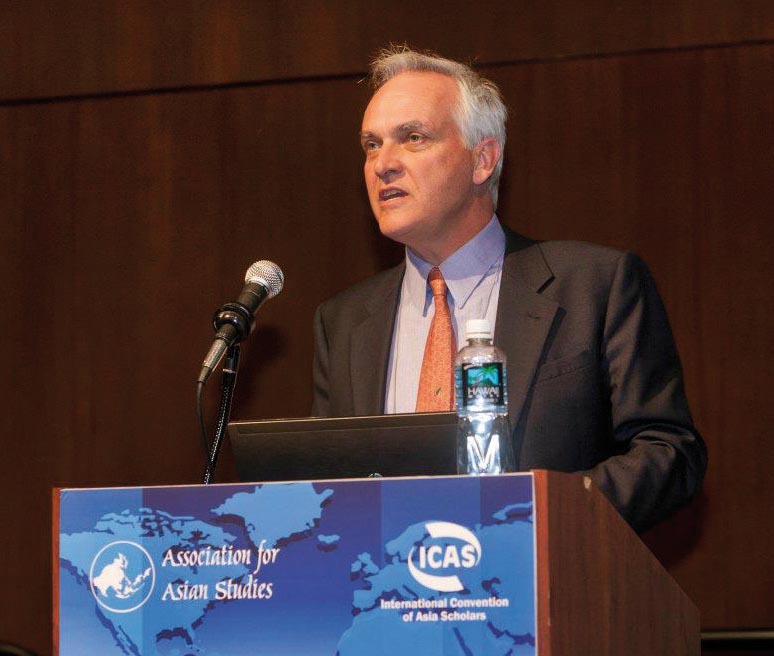
IBP General Secretary Paul van der Velde
The IBP 2011 Reading Committee for Books consisted of Manuela Ciotti, Derek Heng, Alex McKay, Khun Eng Kuah-Pearce, Paul van der Velde (Secretary) and Anand Yang (Chair). The Reading Committee for Dissertations consisted of Birgit Abels and Iza Hussin. For the Humanities, Stein Tønnesson won Best Book for his Vietnam 1946. How the War Began (University of California Press, 2010), and Carmen Perez Gonzalez won Best Dissertation for her ‘A Comparative Visual Analysis of Nineteenth-Century Iranian Portrait Photography and Persian Painting’. The Reading Committees chose the following winners in the category Social Sciences: Uradyn E. Bulag, Collaborative Nationalism. The Politics of Friendship on China’s Mongolian Frontier (Rowman & Littlefield Publishers, 2010) and Imran bin Tajudeen for his thesis ‘Constituting and Reconstructing the Vernacular Heritage of Maritime Emporia in Nusantara: Historic Adaption and Contemporary Accentuations’. The public voted online for the winner of the Colleagues’ Choice Award. It went to Alexander Huang and his Chinese Shakespeares. Two Centuries of Cultural Exchange (Columbia University Press, 2009).
IBP 2013, Macao
Guide to the IBP and the addition of Reading Committee Accolades
At ICAS 8 in Macau we celebrated the fifth edition of the IBP. Within one decade the IBP had grown from an experiment with 38 books and 5 dissertations to an established prize with 250 publications submitted by 60 publishers worldwide and 100 dissertations. As previously mentioned, we wanted to start recognising more titles for their excellence, not just the main winners. In order to increase the diversity and creativity of the judging process and so that the Reading Committees would be able to single out a larger number of books and dissertations, we decided to create the Reading Committee Accolades. The Accolades were to be awarded to any of the books and dissertations submitted, not just those which had made it onto the long/shortlists for the main prizes.
The IBP Reading Committee Accolades were, and continue to be, awarded separately for the two main categories, humanities and social sciences, but the exact Accolades can vary each year (and not all need to be allocated). Accolades are awarded to both Books and Dissertations. Since their inception, the Accolades have included: Publisher’s Accolade for Outstanding Production Value; Most Accessible and Captivating Work for The Non-Specialist Reader Accolade; Specialist Publication Accolade; Ground-Breaking Subject Matter Accolade; Teaching Tool Accolade; Best Art Book Accolade; and the Edited Volume Accolade. The Accolades bring prestige rather than cash prizes with them, but all winners receive an IBP certificate, and some even proudly hang them on their wall. To be a winner of an IBP Main Prize or Accolade, or to be included on the long/shortlist, is an important career milestone; importantly, the inclusion alerts academic publishers to the quality of the authors’ work.
To assist the Reading Committees, I had already in 2009 prepared a modest ‘Guide to the ICAS Book Prize’, which contained an alphabetical enumeration of all submissions so that the readers could check if they had truly received all books. The sharp increase in the number of books in 2013 made it necessary to create a more elaborate ‘Guide’, which now contained structured information to help the Reading Committees to better navigate the multitude of publications. It included an overview of not only titles, authors and publishers, but also the categorical division of books, the regional distribution and the most important topics treated in the publications. The guide also included the procedural regulations, a timetable, and the rules for eligibility of submissions.
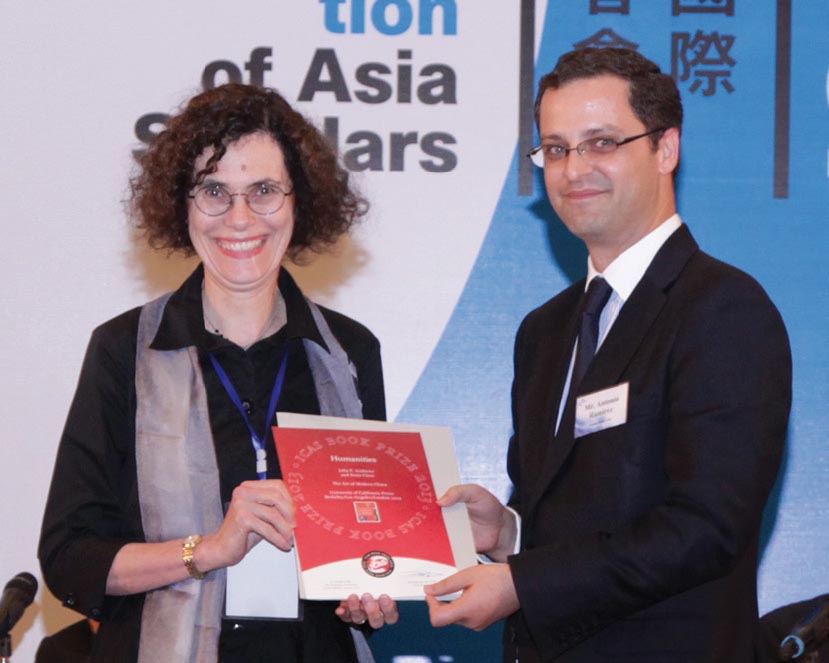
Winner Julia Andrews receiving her Award
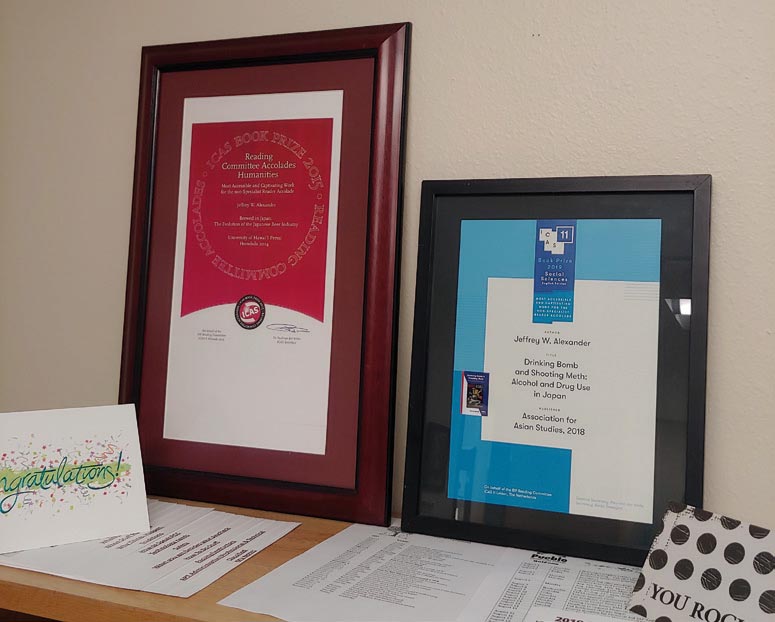
Winners have been known to proudly display their awards
The fifth IBP Awards Ceremony took place during ICAS 8, in The Venetian Macao Resort Hotel on 25 June 2013. The IBP 2013 was sponsored by The Kingdom of the Netherlands represented by the Consulate General in Hong Kong and Macao; ICAS’ mother institution and co-host, The International Institute for Asian Studies; Amsterdam University Press; and the University of Macau. The members of the IBP 2013 Reading Committees were Birgit Abels, Michiel Baas, Sebastian Bersick, Annu Jalais, Alex McKay, Imran bin Tajudeen and Paul van der Velde (Secretary). Together they awarded the following prizes: Best Book in the Humanities went to Julia F. Andrews and Kuiyi Shen, for their The Art of Modern China. (University of California Press, 2012); Best Book in the Social Sciences was received by Miriam Kahn and her Tahiti. Beyond the Postcard. Power, Place, and Everyday Life. (University of Washington Press, 2011); Best Dissertation in the Humanities was awarded to Birgit Tremml for her thesis ‘When Political Economies Meet: Spain, China and Japan in Manila, 1517-1644’; Roberto Benedicto won the Best Dissertation in the Social Sciences for his thesis ‘Bright Lights, Gay Globality. Mobility, Class, and Gay Life in Twenty-first Century Manila’; and the 2013 Colleagues’ Choice Award went to Fabrizio M. Ferrari, Guilty Males and Proud Females: Negotiating Genders in a Bengali Festival (Calcutta: Seagull Books, 2011).
IBP 2015, Adelaide
The New Asia Scholar
The Focus section of The Newsletter #72 (Autumn 2015) was devoted to a phenomenon that we were calling ‘The New Asia Scholar’ (https://www.iias.asia/the-newsletter/newsletter-72-autumn-2015). During ICAS 9 in Adelaide we took note of new trends and developments in Asian studies. The meeting was a particularly useful observatory due to its diversified cross-continental nature. A number of ICAS 9 participants were invited to contribute a piece to The Newsletter, focussing on the question: “Who is the New Asia Scholar?”
The IBP itself has also proven to be an excellent trend identifier and forecaster. For a start, in 2015 we noticed that Asian studies was moving from Western based Asian studies to studies coming from the region itself, based on local conceptual lexicons and theoretical tools. Secondly, the shift from humanities to social sciences, already perceived in 2009, continued and intensified; and thirdly, 50 percent of the authors had an Asian rather than Western background, which was a remarkable rise in numbers.
An issue that had come to worry us more and more was the language in which these submissions were written. International publications have always been dominated by English language works. Presuming English as the lingua franca of Asian studies produces at least two implications: English speaking authors are writing about other cultures in a non-local language, thus missing much of the specific nuances (even though they might proudly speak the local language, they do not tend to publish in it); and non-English writing authors are limited in their international reach (or at the most, their works have been translated into English only after an international publisher has deemed their work ‘interesting enough’). As organisers of the IBP we recognised the growing challenge of having only one language centre stage, and in response to demands from the field we realised the need for a change. Prospective partners were approached to either organise and/or sponsor a number of non-English language editions of the ICAS Book Prize. These were to be launched on time for the next IBP in 2017.
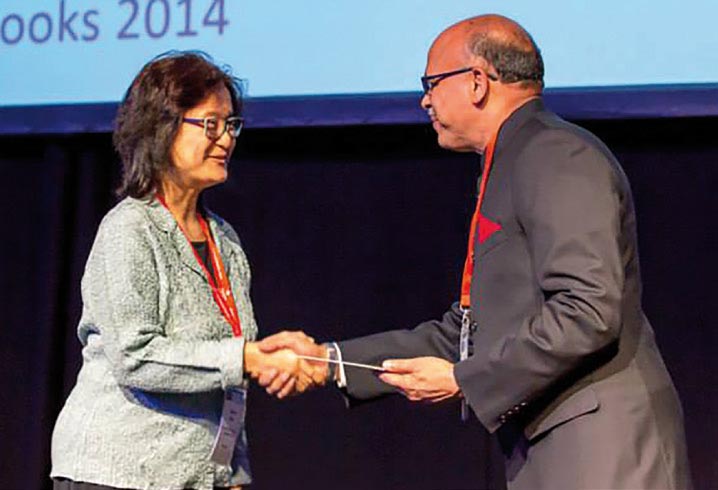
Winner Khoo Salma Nasution (left)
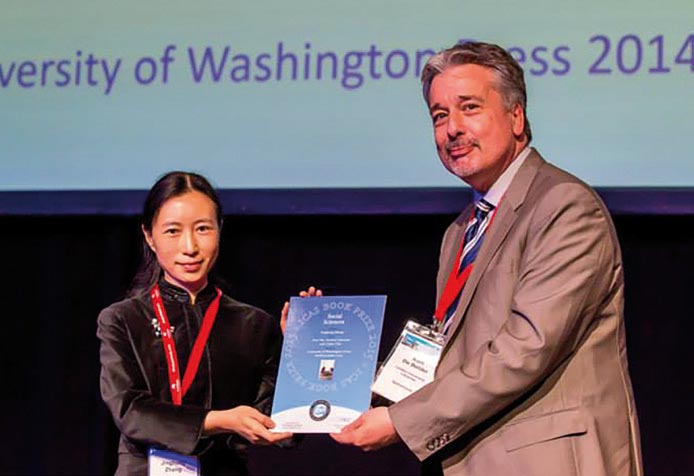
Winner Jinghong Zhang receiving award from Asia Library director Kurt de Belder
One of the incentives for a more diversified and decentralised approach came from our colleagues in Africa, and accordingly, the first ‘A New Axis of Knowledge’ conference was held in Ghana in 2015, to be followed in 2018 by the second meeting in Dar es Salaam. Alongside the two meetings also came the regional version of the ICAS Book Prize: the Africa-Asia Book Prize. Books submitted to this prize focussed on Africa-Asia relations and Asian studies in Africa. The first two editions were organised by the ICAS Secretariat, but the third edition of the Africa-Asia Book Prize (probably 2021) will be organised by the African Association for Asian Studies (A-Asia), the main force behind the establishment of the Africa-Asia ‘New Axis of Knowledge’ meetings.
Another interesting, more logistical development, was the sheer number of books being shipped to our offices every two years. Publishers were sending us 6 copies of each submitted title, which we then forwarded to the Reading Committee members. For the IBP 2015 we received approximately 1500 books! Our offices turned into a warehouse cum distribution centre. Someone finally came up with the bright idea to ask the publishers to send the hard copies straight to the Reading Committee members. This was only one of the solutions to the many practical problems when running what had become one of the biggest book prizes in the world. Another solution found was to the problem of the growing collection of books from previous editions of the IBP; by now more than six hundred books filled two book cases in the ICAS Secretariat’s office. What could be a better destination than the Leiden University Library, especially since it was precisely at that time building a whole entire floor to house its new Asian Library? Consequently, an agreement was signed between the Leiden University Library and our mother institute, the International Institute for Asian Studies (IIAS), that the Asian Library would become the sponsor of the IBP. In return, we gifted the library all remaining books from previous (and future) IBP editions.
The IBP 2015 Awards Presentation took place in the Adelaide Convention centre during the ICAS 9 Opening Ceremony. The Reading Committees were composed of Christina Firpo, Duncan McDuie-Ra, Alex Mckay, Aysun Uyar, and Paul van der Velde. They awarded Best Book in the Humanities to Adam Clulow, The Company and the Shogun: The Dutch Encounter with Tokugawa Japan (Columbia University Press, 2014); Best Book in the Social Sciences went to Jinghong Zhang, Puer Tea. Ancient Caravans and Urban Chic (University of Washington Press, 2014); awards for Best Dissertation went to (respectively for Humanities and Social Sciences) Deokhyo Choi for his ‘Crucible of the Post-Empire: Decolonization, Race, and Cold War Politics in U.S.-Japan-Korea Relations, 1945-1952’ and Tutin Aryanti for her ‘Breaking the Wall, Preserving the Barrier: Gender, Space, and Power in Contemporary Mosque Architecture in Yogyakarta, Indonesia’. Finally, the public voted for the winner of the Colleagues’ Choice Award, which in 2015 went to Khoo Salma Nasution, The Chulia in Penang: Patronage and Place-Making around the Kapitan Kling Mosque 1786-1957 (Penang: Areca Books, 2014).
IBP 2017, Chiang Mai
A multilingual discourse at the IBP party
ICAS is a successful facilitator of localised but connected knowledge about Asia, and an enthusiastic actor in the decentring of knowledge about and in Asia. As a reflection of this approach the IBP enacted its existing wish to diversify its language basis. The ICAS Secretariat successfully enthused relevant institutes operating in Chinese, French, German and Korean to take on the challenge to organise their own respective language editions of the IBP: The Education University of Hong Kong (Chinese Edition), Groupement d’intérêt scientifique Études asiatiques (GIS Asie) (French Edition), the German Institute of Global and Area Studies (GIGA) and the Schweizerische Akademie für Geistes- und Sozialwissenschaften (SAGW) (German Edition), and Seoul National University Asia Center (SNUAC) (Korean Edition). Together with the Asian Library/Leiden University (English Edition), the IBP was now shouldered by six institutions in Asia and Europe. All books were submitted centrally through the ICAS website, but each Language Secretariat was responsible for their own Reading Committees, for contacting publishers/submitters, and for collecting hard copies. They all succeeded in receiving at least 30 books (a commendable start, comparable to the first English instalment); the Korean Language Secretariat outdid all with nearly 100 submissions.
The Secretariat of each language edition, and in cooperation with the IBP General Secretariat, put together a Reading Committee of four persons, representing the field of Asian studies in the widest sense. Towards the end of this new multi-language edition I decided to relinquish my position as Secretary. I handed over those duties to Sonja Zweegers, Editor of The Newsletter at IIAS, and I took on my new role as General Secretary of the IBP, in order to coordinate the various language editions, and secure all necessary agreements and sponsorships.
The IBP 2017 Awards Presentation took place on 20 July in the Plenary Hall of the Chiang Mai International Exhibition and Convention Centre. It was memorable to see the winners of all the language editions on stage. Upon leaving the hall everyone was given the ICAS Book Prize 2017 publication, a new initiative by the ICAS Secretariat. The booklet listed all shortlisted books, winners, citations, Reading Committees, organisers and sponsors.
In previous years there had always been a small IBP dinner organised for the winners and Reading Committee members, but with the growing numbers involved we decided to throw a proper IBP party. The winners were given the floor to say a few words (which had not been possible during the ceremony). Our first multilingual ICAS Book Prize party was a roaring success, lasting well into the wee hours.
The English language Reading Committee members for Books were Manuela Ciotti, Tom Hoogervorst, Claudio Pinheiro, Tina Shrestha and Paul van der Velde (Secretary). They awarded the Best Book in the Humanities to Seth Jacobowitz, Writing Technology in Meiji Japan. A Media History of Modern Japanese Literature and Visual Culture (Harvard University Asia Center, 2015); and Best Book in the Social Sciences was awarded to Han F. Vermeulen, for his Before Boas. The Genesis of Ethnography and Ethnology in the German Enlightenment (University of Nebraska Press, 2015).
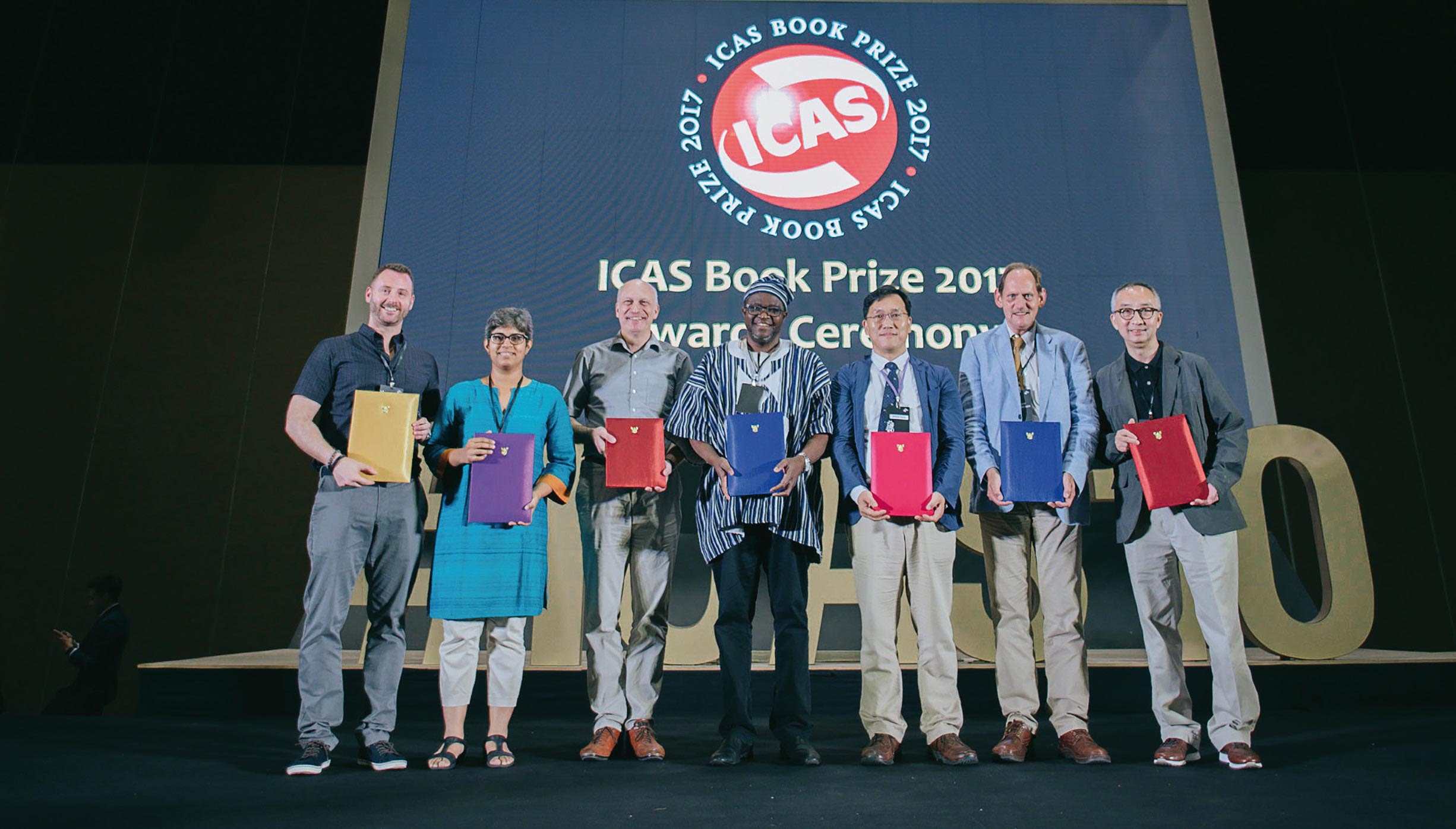
IBP 2017 All Winners
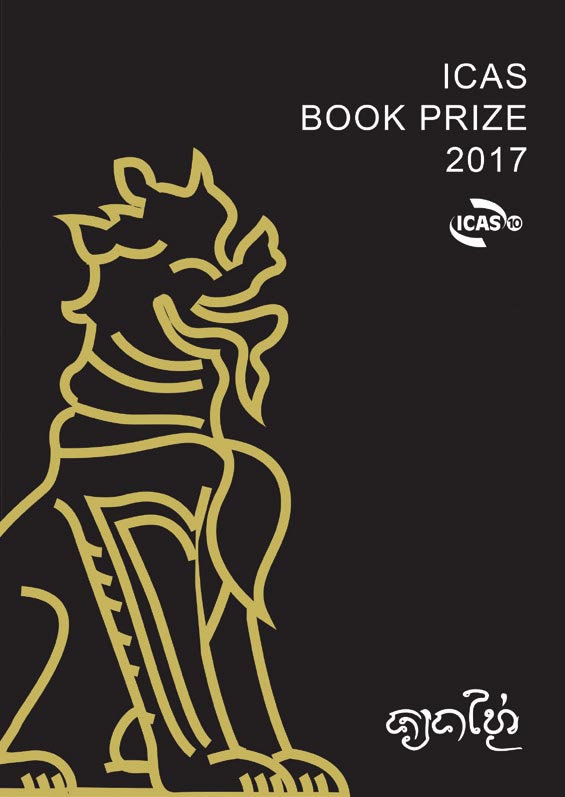
IBP 2017 Booklet
The Reading Committee for Dissertations included Tutin Aryanti, Deokhyo Choi and Alex McKay (Chair). They awarded Best Dissertation in the Humanities to Lisa Hellman, for her ‘Navigating the Foreign Quarters: Everyday Life of the Swedish East India Company Employees in Canton and Macao 1730–1830’; and Best Dissertation in the Social Sciences to Gauri Bharat, for her ‘Place-making Through Practice: An Interdisciplinary Approach to Santal Architectural History’. And finally, the Colleagues’ Choice Awards (respectively for Humanities and Social Sciences) went to Christina Elizabeth Firpo, The Uprooted: Race, Children, and Imperialism in French Indochina, 1890-1980. (University of Hawai’i Press, 2016) and Adams Bodomo, Africans in China: Guangdong and Beyond (New York: Diasporic Africa Press, 2016).
And for the first time, the German language edition awarded their main prize to Hans van Ess, Politics and Historiography in Ancient China: Pan-ma i-t’ing; the Chinese language edition Best Book went to Lui Tai-Lok, Hong Kong Model: From the Present Tense to the Past Tense; the main prize of the French language edition was received by Marine Carrin, The Language of the Gods. Santal Ritual Discourse Between the Oral and the Written (India); and the Korean language edition recognised as Best Book: Jaehun Jeong, The History of Turk Empire 552-745: The Rise and Fall of Ashna's Power.
A number of publishers also attended the IBP party, as they had travelled to Chiang Mai to exhibit their products and services at the ICAS Asian Studies Book Fair. The number of publishers involved in the IBP English edition had been quite stable (at 60) for a few years, however, for the first time we could clearly discern a core group of seven publishers that had submitted more than 15 books. These were, in alphabetical order: Amsterdam University Press, Brill Publishers, Cambridge University Press, Harvard Asia Center, ISEAS Publishing, NIAS Press, and the University of Washington Press. The following 13 publishers submitted five to ten books: Columbia University Press, Cornell University Press, Hong Kong University Press, Hurst & Company, Lexington Books, NUS Press, Oxford University Press, Peter Lang, Polity Press, Primus Books, Routledge, SUNY Press, and University of Hawai’i Press. The remaining publishers, most of them academic, submitted up to five books. It was clear that the majority of publishers producing books on Asia (in English) were located in either USA or Europe, although we were also made aware that an increasing number of these companies were opening up branches in Asia, so as to be able to effectively scout new authors in the field, the majority of whom are from Asia. This was also the main reason for them to exhibit at ICAS, where most of the participants hail from the region.
IBP 2019, Leiden
The IBP Books and Dissertations Carousel
The IBP Books and Dissertations Carousel had been set in motion as an experiment during ICAS 9 in Adelaide, had matured at ICAS 10 in Chiang Mai, and had now come of age during ICAS 11 (15-19 July 2019) in Leiden. Eighty presentations took place during 15 sessions, nearly half by young doctors for whom the IBP Carousel was initiated in the first place: “to offer young doctors the opportunity to briefly present the significance of their work to an audience of interested scholars, publishers and potential employers, who in turn may question the candidates on their findings. This is also intended to be a relatively informal chance for presenters to meet others interested in their field of enquiry”. A number of presentations (in English) were about books written in languages other than English, and we hope that this platform will indeed see even more non-English language authors during future editions.
With another hat on, as IIAS Publications Officer, and together with my assistant Mary Lynn van Dijk, we convened a panel at ICAS 11 on the three IIAS Book series (‘Global Asia’, ‘Asian Cities’, ‘Asian Heritages’), with the aim to look back on the 25 monographs and edited volumes published in these series in the past four years. The series editors took the lead in explaining how they work and what kind of manuscripts they want to include in their series. Tak-Wing Ngo (organiser of ICAS 8 in Macau and IIAS alumnus) said the following about his ‘Global Asia Series’ (although this could also apply to the IBP and ICAS in general): “The Series takes issue with the conventional practice of treating Asia as merely the empirical testing ground for universalized theories developed from Western experiences. Instead, it underlines the contributions of Asian knowledge, values, and practices in making our modern world. The Series deliberately keeps a broad scope to include studies that focus on a wide range of topics and disciplines. Books published under the Series are unified not by a common theme or theoretical approach, but by a critical stance that highlights the autochthonous contributions of Asia to social sciences. As such, the Series as a whole addresses contemporary issues related to transnational interactions within the Asian region, as well as Asia’s projection into the world through the movement of goods, people, ideas, knowledge, ideologies, and so forth. Priorities are given to well-researched manuscripts that seek to develop new perspectives and theories about global Asia”.
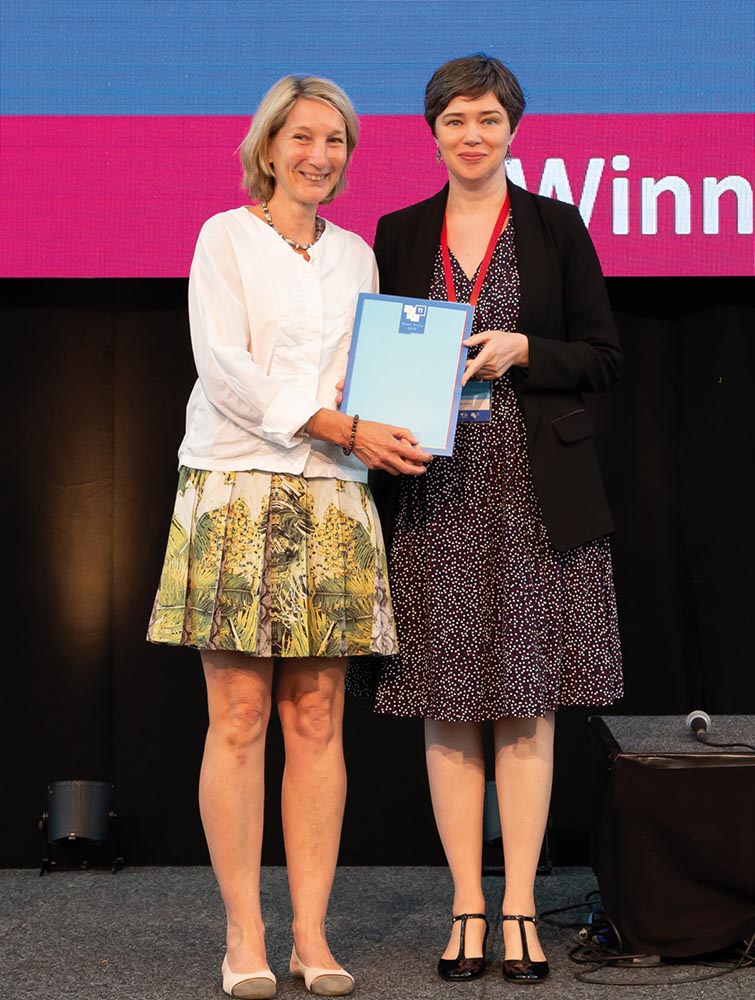
Winner of the French language edition Marianne Bujard (left) with the Secretary of the French language edition, Aurelie Varrel (right).
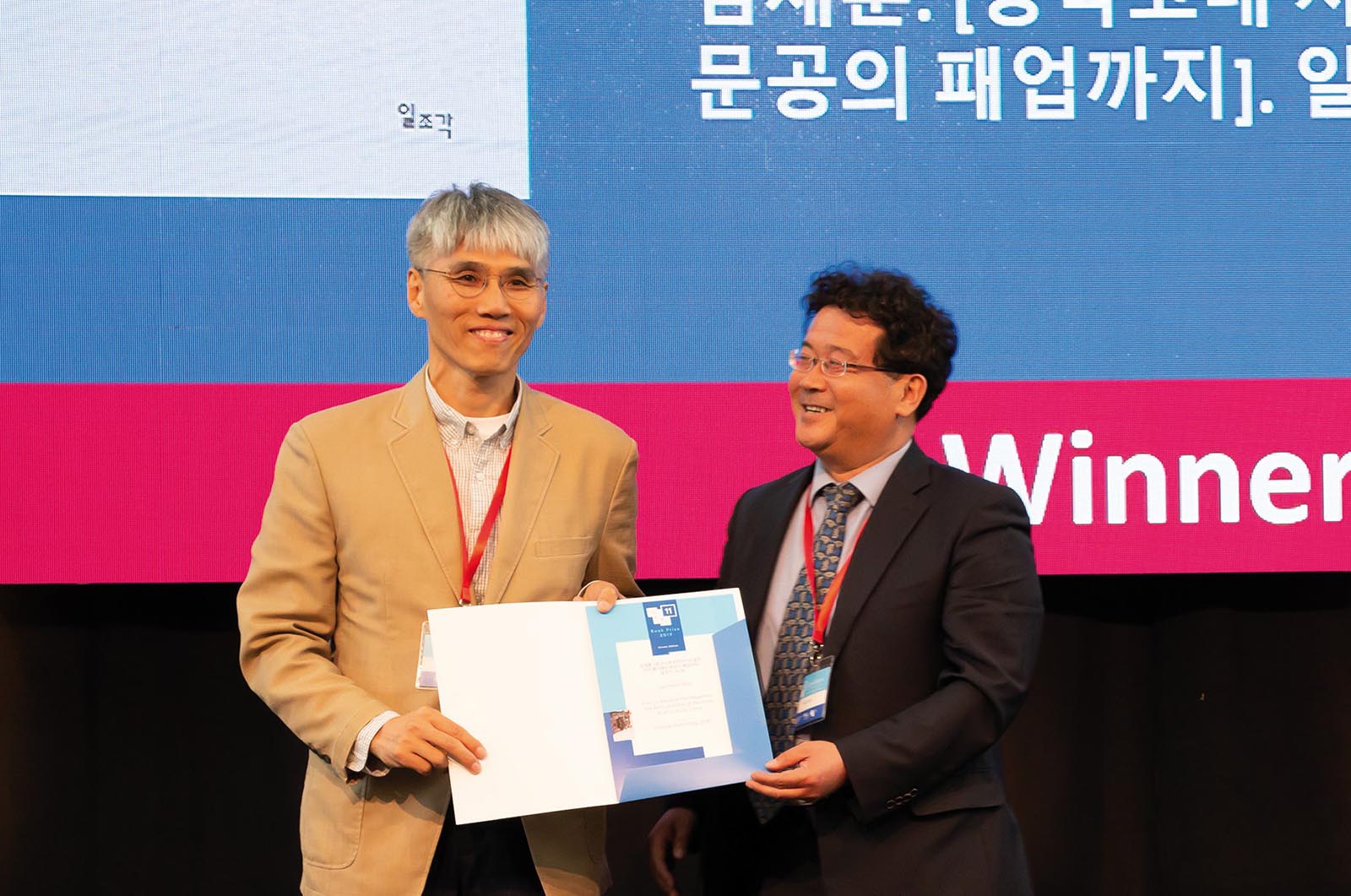
Winner Korean Language Edition Jae-hoon Shim (left).
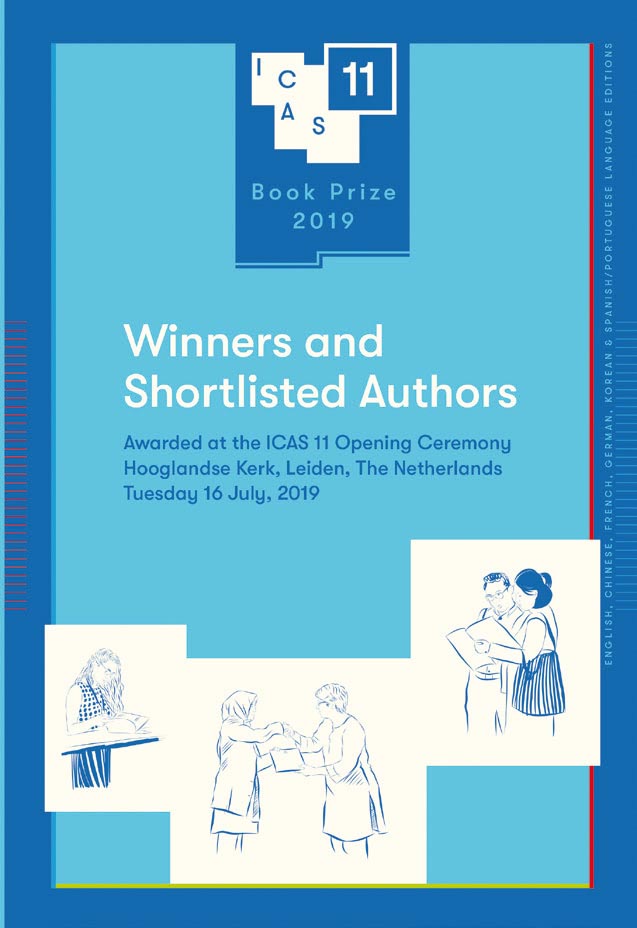
IBP 2019 Booklet
The IBP dinner was, with over 30 guests, a particularly generous affair this year as we had now added yet another language edition to the group: a combined Spanish/Portuguese edition, organised by Sephis. Its Chair, Claudio Pinheiro, had performed in-depth research into the state of affairs of Asian studies in Latin America before establishing the Secretariat. His efforts resulted in no less than 66 publications submitted for their first IBP in 2019. With this new language edition successfully in place, I was motivated to add yet 2 more to the array: Japanese and Russian. ICAS 12 will take place in 2021 in Kyoto, and so I invited Aysun Uyar Makibayashi from Doshisha University (and former IBP Reading Committee member) to the 2019 dinner, in an attempt to convince her to join the team. (I can now announce that she agreed and there will indeed be a Japanese language edition of the IBP 2021). Another guest at the dinner was Alexey Maslow, Director of the Institute of Far Eastern Studies of the Russian Academy of Sciences (IFES), and keynote speaker in the SASS-IIAS Forum on the Belt and Road Initiative at ICAS 11. Alexey had been invited for the dinner after he had made clear his ambition to set up the Russian Edition of the IBP (as with the Japanese edition, I can share the good news that indeed, there will also be a Russian language edition for the IBP 2021). There are very strong Asian studies traditions going back centuries in both Russian and Japanese. It is only natural that they are part of the IBP, along with the excellent studies written in those languages, which should become part of the international discourse on Asian studies. In his editorial for The Newsletter #84 (Autumn 2019, p.3) ‘Reinventing the academic conference’ the director of IIAS, Philippe Peycam, a supporter of the IBP’s multilingual approach, commented: “ICAS now runs an inclusive space in which different social stakeholders – from academic to cultural institutions, from citizen associations and regions – work hand-in-hand to promote scholarly knowledge in society”.
The IBP 2019 awards ceremony took place during the opening of ICAS 11, in Leiden’s Hooglandse Church, on 16 July 2019. More than 2000 people attended the ceremony, and all were presented the ICAS Book Prize 2019 publication at the end of the session. The booklet included all shortlists, winners, sponsors, organisers, reading committees of the IBP 2019. The English language Reading Committee for Books included Seth Jacobowitz, Rachel Leow, Thien Huong Ninh, Olga Sooudi, and Sonja Zweegers (Secretary). The prize for Best Book in the Humanities went to Howard Chiang, After Eunuchs: Science, Medicine, and the Transformation of Sex in Modern China (Columbia University Press, 2018); Best Book in the Social Sciences was awarded to Sareeta Amrute, Encoding Race, Encoding Class: Indian IT Workers in Berlin (Duke University Press, 2016). The members of the Reading Committee for Dissertations were Bart Luttikhuis, Alex McKay (Chair) and Anna Romanowicz. They awarded Best Dissertation in the Humanities to Leonor Veiga for her ‘The Third Avant-garde: Contemporary Art from Southeast Asia Recalling Tradition’; and Best Dissertation in the Social Sciences to Aleksandra Lee for her ‘Modeling China: Business, Politics, and Material in China's Museum Industry’. The Colleagues’ Choice Awards (respectively for Humanities and Social Sciences) went to Abdur-Razzaq Lubis, Sutan Puasa: Founder of Kuala Lumpur (Areca Books, 2018) and Azmil Tayeb, Islamic Education in Indonesia and Malaysia: Shaping Minds, Saving Souls (Routledge, 2018).
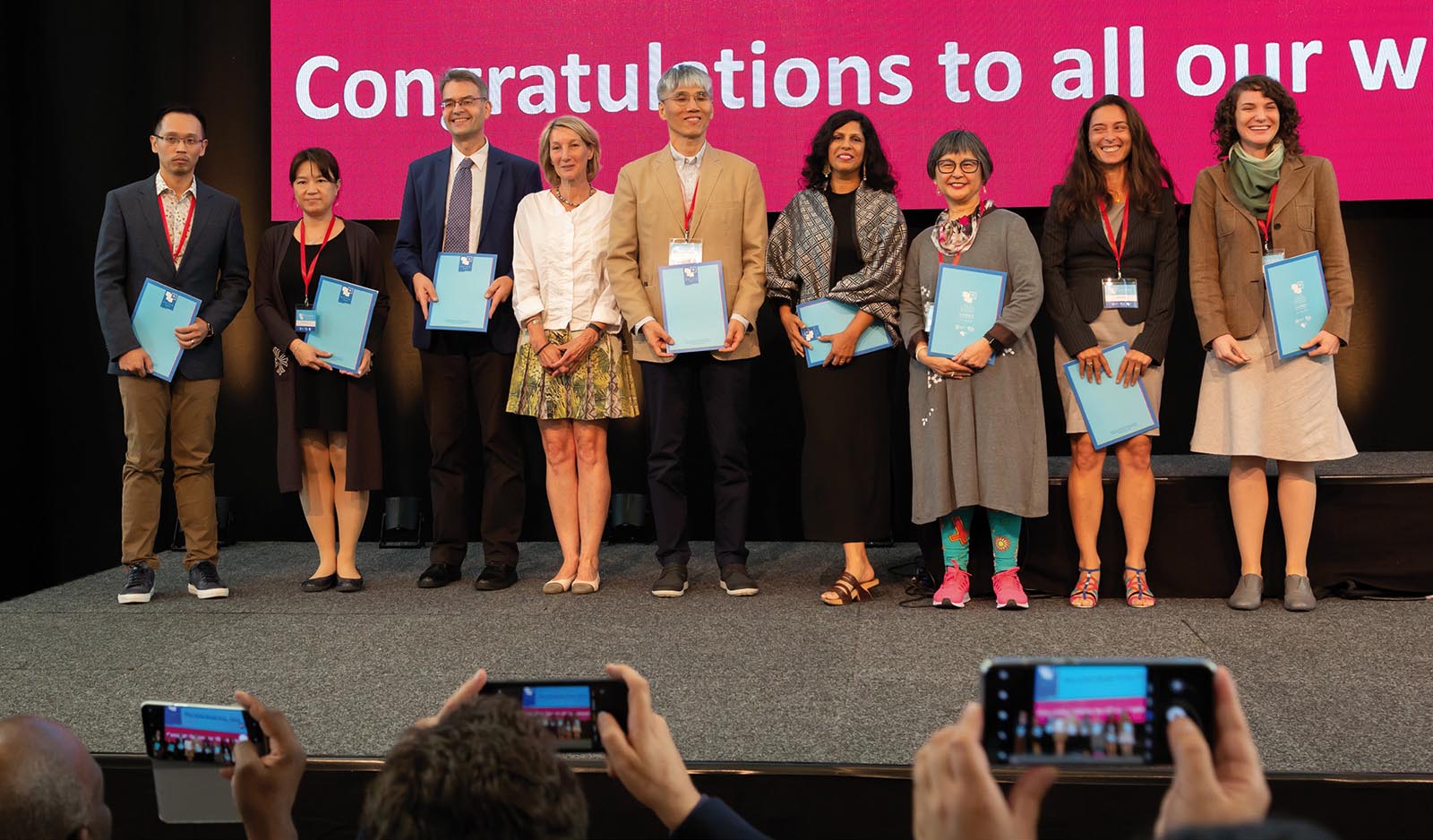
IBP 2019 All Winners
The Main Prize for the Chinese language edition was awarded to Feng-mao Li, Transforming ‘Sacred Religion’ into Daoism: Festival, Belief, and Culture in the Chinese Society of Malaysia (National Taiwan University Press, 2018). The French language Reading Committee recognised as Best Book, Michèle Pirazzoli-t'Sersteven and Marianne Bujard, The Qin and Han Dynasties: General History of China (221 BC-220 AD) (Les Belles Lettres, 2017). Thomas Zimmer, Awakening from the Coma? A Literary Positioning of Today's China (Tectum Wissenschaftsverlag, 2017) was the winner of the 2019 German language edition. Best Book in the Korean language was awarded to Jae-hoon Shim, From a Vassal to the Hegemon: The Birth and Rise of the State of Jin in Early China (Ilchokak Publishing, 2018). And for the first time, the Spanish/Portuguese edition presented its ICAS Book Prize; in fact it had two winners: Madalena Natsuko Hashimoto Cordaro, Japanese Erotica in Painting and Writing of the 17th to 19th centuries, 2 volumes (USP, 2017) and Óscar Figueroa, The Preceding View: Visionary Power and Imagination in Ancient India (UNAM, 2017).
IBP 2021, Kyoto
Looking back to the future
From the beginning the IBP has been a general book prize of a region and discipline transcending nature. From its seventh edition in 2017 it also became multilingual; by adding Japanese and Russian for the upcoming ninth edition in 2021, the ICAS Book Prize will be considering nine languages that have (long) established research traditions in Asian studies. Is it conceivable to add even more languages to the IBP without it imploding? I am of the opinion that because English is one of the official languages of India, Hindi or Tamil editions will be unlikely. Bahasa Indonesia, spoken throughout the Malay world, Swahili as the biggest East African language, and Arabic spoken and read throughout the Islamic world, could be possible candidates.
The number of submissions for each language in 2019 varied from 20 to 100 (not taking into account the English edition with 400 submissions plus 150 dissertations). The various language editions together received a total of 754 submissions in 2019, and we expect that next time we will reach the one thousand mark.
Each language edition is organised and sponsored by an Asian studies institution, and has its own Reading Committee (normally of 4 academics). The scholars who have been a committee member in the past have experienced the horizon-widening experience of the IBP. They received and processed books from not only their own fields of study, but far beyond. Many of them have used the submitted books as pedagogical tools in their teachings on Asia. They work together with the other committee members, and somehow always seem to agree on who should be the winner. A detail that may change during the next few instalments of the IBP, is ‘how’ they read the submissions. So far, publishers have always been asked to send hard copies of all submitted titles, but as we speak we have opened submissions for the IBP 2021 and have decided to include the option of e-books (at least for the English language edition). The idea has been floating for a while, but during the ongoing COVID-19 crisis we have been made aware that many packages are not reaching their destination. For that reason, we deliberated with our Reading Committee members and gave them the choice. Some chose for e-books, also out of environmental considerations, others continue to prefer hard copies. We shall see how this develops in the future.
How the IBP will be further impacted by the de-globalising tendencies in the world today, no one can be sure about. However, we do predict that the new Russian language edition will attract a higher number of titles on Central Asia, the Japanese edition will likely introduce us to topics we have never even heard of before, more and more of the authors will originate from Asia and be published by Asia-located publishers, more Asian authors will write about Asian countries other than their own, more books on Asia will be written in a language other than English, etc. And the ICAS Book Prize will continue to boost and document all these developments through its original aim: to increase the global visibility of and interest in academic works on Asia.
Another way in which the IBP works to make Asian studies and its publications more visible and accessible is through the ICAS Book Fair. The last few ICAS meetings have seen between 30-40 publishers exhibit their wares and services, but this number could rise because of the increasing number of languages involved in the IBP. Closely connected to the IBP is the ICAS Books and Dissertations Carousel, in which authors present their recent work; it has witnessed a clear growth in the number of presentations of books not written in English, thus familiarising wider and wider audiences with works written in non-English languages. We have also seen how presentations of dissertations are increasingly impacted by developments in IT. Quoting the Chair of the IBP Dissertations Reading Committee, Alex MacKay: “What is also notable is that the form of a doctoral dissertation has lost the traditional boundaries of extensive text and relevant illustration. Many submissions incorporate video and other technological innovations of the last decades, once tentatively but now confidently deployed by a generation that has grown up with new tools of expression. That tendency, like ICAS itself, is likely to only grow”. So far, the IBP has only accepted dissertations written in English, but this does not exclude the possibility of dissertations in other languages in the future.
The Colleagues’ Choice Award was introduced in 2007, and has been included in every instalment of the IBP ever since. However, with the steep yearly rise in the number of votes we are no longer able to guarantee the validity of the polls, and so after the IBP in 2019 we decided to stop awarding this prize. Nevertheless, we are convinced that the Colleagues’ Choice Award has made the IBP more popular by highlighting books that would otherwise have gone unnoticed. Fortunately, we will of course continue to award Reading Committee Accolades to the submitted Books and Dissertations. The Accolades are an invaluable method to acknowledge a larger number of very deserving titles.
Why compete for the ICAS Book Prize? Where will it get you? Well, Alex MacKay, one of the pillars of the IBP, wrote on that matter in The Newsletter (issues 76 and 83): “The best dissertations will have the primary merit of originality, along with scholastic qualities such as depth (and breath) of research, evidence of intellectual quality, clear and sophisticated arguments, good organization and presentation of evidence leading to significant conclusions liable to be of interest to the wider field, a consistent and properly considered theoretical and/or methodological framework, and of course it must include due acknowledgement of sources and proper presentation of bibliography, notes and associated scholastic apparatus. They will also have the minimum of typographical errors and the standard writing and use of English language will be of a good standard.” The criteria for the IBP Book Reading Committee were summarised as follows: “There are several criteria which determine what is a good book: originality in the treatment of the topic; the depth of the research; opening up a new field of research; providing a definitive study on a certain topic; being well written or making clear arguments. […] Inclusion on the [long]list is a significant achievement and means that the author belongs to the top tier of Asia scholars.” With these considerations in mind the Reading Committees start their yearlong reading process, which results in longlists, then shortlists. Being included on those lists is already a great honour and references to them frequently pop up on CV’s of scholars to enhance their resume. The winners of the prizes are ultimately those that come closest to the criteria outlined above and for them it means a boost to their careers and a reward for many years of meticulous and intensive research. The recognition for one’s work, knowledge and dedication that comes with winning the ICAS Book Prize is priceless, often leading to unexpected but well-deserved career-related rewards.
The ninth edition of the IBP is on the horizon; during its Awards Ceremony I will step down as General Secretary, yet this will by no means be the last page of the IBP. I am convinced that the Book Prize will further blossom in the capable hands of my successor. It is no exaggeration to state that the IBP has grown from just one of the book prizes in the field of Asian studies to the leading Book Prize in its field. Who could have dreamt that when we announced the ICAS Book Prize at the beginning of this century?
Paul van der Velde, General Secretary of the ICAS Book Prize
